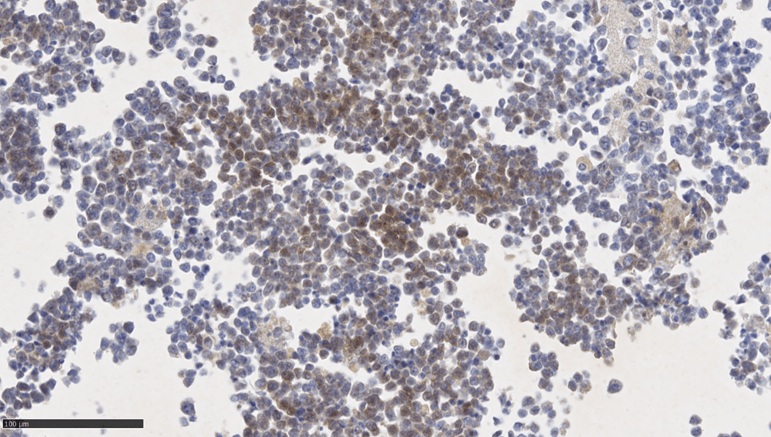Cat. #152627
Anti-V(beta)3 T cell receptor (TcR) [JOVI.3]
Cat. #: 152627
Sub-type: Primary antibody
Unit size: 100 ug
Availability: 3-4 weeks
Target: V(beta)3 T cell receptor (TcR)
Class: Monoclonal
Application: FACS ; IHC ; IP ; Fn
Reactivity: Human
Host: Mouse
£300.00
This fee is applicable only for non-profit organisations. If you are a for-profit organisation or a researcher working on commercially-sponsored academic research, you will need to contact our licensing team for a commercial use license.
Contributor
Inventor: Mike Owen
Institute: Cancer Research UK, London Research Institute: Lincoln's Inn Fields
Tool Details
*FOR RESEARCH USE ONLY (for other uses, please contact the licensing team)
- Name: Anti-V(beta)3 T cell receptor (TcR) [JOVI.3]
- Research fields: Cell biology;Immunology;Immuno-oncology;Immunophenotyping
- Clone: JOVI.3
- Tool sub type: Primary antibody
- Class: Monoclonal
- Conjugation: Unconjugated
- Reactivity: Human
- Host: Mouse
- Application: FACS ; IHC ; IP ; Fn
- Description: Monoclonal antibody used in the study of T cell diseases, and as a CAR therapy in T cell lymphoma/leukaemia. Background and Research Application The T cell receptor is heterodimer of alpha/beta or gamma/delta chains, expressed on all mature T cells. TCR's recognise antigen peptides bound to MHC molecules, providing the basis of antigen specific response by T cells. JOVI.3 can be used for studies of T cell mediated diseases, including autoimmunity and allergy. The antibody recognises any human T cell receptor that has the V beta 3 region, staining 50-75% of peripheral blood T cells and T cell lines.
- Immunogen: Thymus, spleen and mesenteric lymph nodes isolated from a mouse transgenic for human Vb3 TcR.
- Immunogen uniprot id: P09693
- Isotype: IgG2a
- Myeloma used: P3/NS1/1-Ag4.1
- Recommended controls: CD3 positive PBMCs
Target Details
- Target: V(beta)3 T cell receptor (TcR)
- Tissue cell line specificity: CD3 positive PBMCs
- Target background: Monoclonal antibody used in the study of T cell diseases, and as a CAR therapy in T cell lymphoma/leukaemia. Background and Research Application The T cell receptor is heterodimer of alpha/beta or gamma/delta chains, expressed on all mature T cells. TCR's recognise antigen peptides bound to MHC molecules, providing the basis of antigen specific response by T cells. JOVI.3 can be used for studies of T cell mediated diseases, including autoimmunity and allergy. The antibody recognises any human T cell receptor that has the v?3 region, staining 50-75% % of peripheral blood T cells and T cell lines.
Applications
- Application: FACS ; IHC ; IP ; Fn
Handling
- Format: Liquid
- Concentration: 1 mg/ml
- Unit size: 100 ug
- Storage buffer: PBS with 0.02% azide
- Storage conditions: Store at -20° C frozen. Avoid repeated freeze / thaw cycles
- Shipping conditions: Dry ice
References
- Viguier et al. 2015. J Invest Dermatol. 135(2):418-24. PMID: 25207820.
- Peripheral and local human papillomavirus 16-specific CD8+ T-cell expansions characterize erosive oral lichen planus.
- San Jos et al. 1999. J Biol Chem. 274(47):33740-6. PMID: 10559266.
- Receptor engagement transiently diverts the T cell receptor heterodimer from a constitutive degradation pathway.
- Sahuquillo et al. 1998. J Exp Med. 187(8):1179-92. PMID: 9547330.
- T cell receptor (TCR) engagement in apoptosis-defective, but interleukin 2 (IL-2)-producing, T cells results in impaired ZAP70/CD3-zeta association.
- Viney et al. 1992. Hybridoma. 11(6):701-13. PMID: 1284120.
- Generation of monoclonal antibodies against a human T cell receptor beta chain expressed in transgenic mice.





